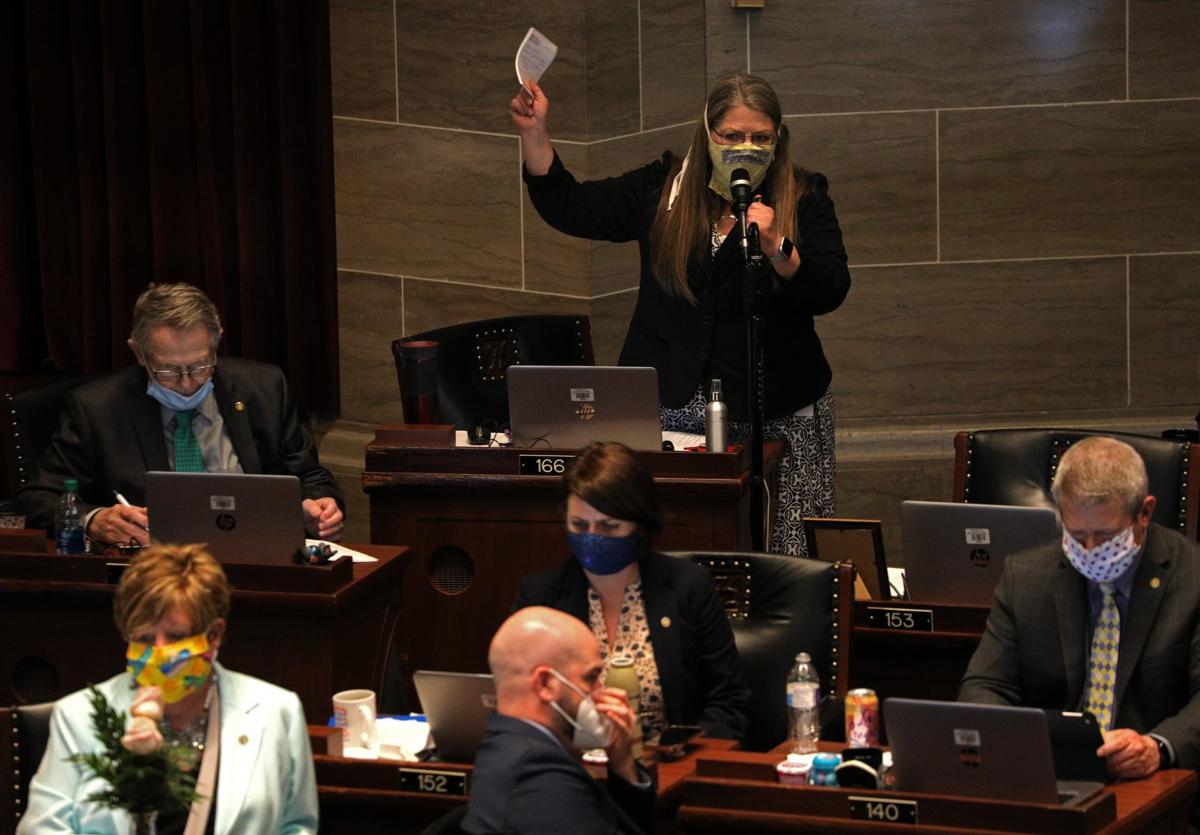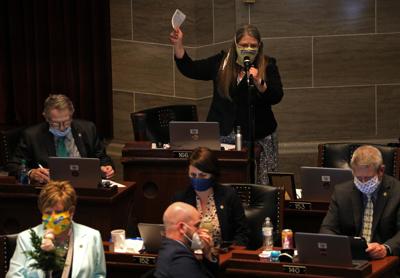On final day, Missouri lawmakers approve new vote-by-mail options

State Rep. Gina Mitten, D-Richmond Heights, speaks on the House floor on Friday, May 15, 2020, during the final day of the legislative session in the Missouri capitol building in Jefferson City. Photo by Christian Gooden, cgooden@post-dispatch.com
Christian Gooden
JEFFERSON CITY — Over the objections of the state’s top election chief, Missouri lawmakers moved Friday to expand mail-in voting options during the global pandemic.
Missouri currently only allows people to mail their ballots for specific reasons, such as illness or travel away from home on Election Day.
Under legislation heading to Gov. Mike Parson’s desk, voters can use the illness excuse if they are 65 or older or live in a nursing home. They also qualify if they have chronic lung disease, moderate to severe asthma, heart conditions, diabetes, kidney disease, liver disease or if their immune systems are compromised.
People who don’t qualify for one of the excuses also can use a mail-in option, but they will need to get their ballot notarized.
The proposal covers only the August and November statewide elections.
It was among a number of high-profile proposals volleyed between the House and Senate on their final day of their annual session, including changes to the criminal code designed to crack down on carjacking and gun crimes.
Some initiatives fell short, including a bid to repeal the residency requirement for St. Louis police officers and an attempt to exempt health care providers from liability connected to the coronavirus.
A last-minute push to allow restaurants to permanently sell to-go cocktails also failed.
In all, the two chambers sent less than 50 bills to Gov. Mike Parson, down from previous years when more than 100 different bills were sent to the governor’s office.
The relatively meager results of the 2020 session reflect the effects of the spread of the coronavirus. Six weeks were lost when both chambers shut down in March.
House Democrats said Republicans did not focus enough on laws that could help people weather the pandemic and instead conducted a “business-as-usual agenda” when they returned three weeks ago.
“We can walk and chew gum at the same time,” House Speaker Elijah Haahr said in response.
The final version of the “no excuse” vote by mail proposal was worked out in a frenzy of activity Thursday night.
In doing so, however, negotiators removed language that revived part of the state’s controversial voter ID law, which was dumped by the Missouri Supreme Court.
Republican Secretary of State Jay Ashcroft, who oversees the state’s elections, also said he could not support the removal of the voter identification provisions.
“Without the agreed-upon safeguards, I have grave concerns that this bill will make voting less secure and jeopardize the integrity of our elections,” Ashcroft said.
Sen. Bob Onder, R-Lake Saint Louis, worried that people are using the pandemic to promote the possibility of voter fraud.
“I don’t like the idea that the voter ID fix was taken out of this. I have problems with a law that touches on our most sacred right,” Onder said.
But Senate Majority Leader Caleb Rowden, R-Columbia, said the decision to allow mail-in voting during the COVID-19 pandemic was the right thing to do.
“This was a late developing sort of thing that we felt, you know, was worthy of a last-minute push,” he said.
A coalition of voting rights groups, including the American Civil Liberties Union of Missouri and the League of Women Voters, also are pursuing legal action, arguing in Cole County court that people sheltering in place to avoid the spread of the virus should be able to use the illness excuse to vote by mail.
The legislation is Senate Bill 631.
Lawmakers also sent Parson a package of proposed laws focused on crime and guns. It creates the new felony offense of “vehicle hijacking.” The crime will carry steeper penalties for someone who is armed or displays “what appears to be a deadly weapon or dangerous instrument.”
The legislation also eliminates probation, suspended sentences or parole for some repeat felony offenders, as well as for anyone who uses a weapon to commit a “dangerous felony.” Other provisions would increase the minimum sentences for several crimes, including armed criminal action — or the use of a deadly weapon to commit a felony — when the weapon used is a gun.
Lawmakers also approved a plan sponsored by Senate Minority Leader John Rizzo, D-Kansas City, to provide COVID-19 tests for Missouri residents.
Federal stimulus money would pay for testing expenses that aren’t covered by a resident’s health insurance provider. The expenses covered would be capped at $150, and a health care provider must recommend the test.
The proposed law also requires the state to provide care for women who screen positive for postpartum depression. It expands Medicaid benefits for mothers who need the treatment from 60 days to up to one year.
“With the added stress and concerns for new mothers during the COVID-19 pandemic, this legislation is more important than ever,” said Sen. Jill Schupp, D-Creve Coeur, who sponsored the measure.
The legislation is House Bill 1682.
How key state legislation fared in 2020
Signed by governor
License reciprocity: Recognizes occupational licenses granted in other states for a range of professions, including nurses, hairdressers and others. (HB 2046)
Approved
Clean Missouri: Places a constitutional amendment on the ballot that asks voters whether to overturn a new legislative redistricting process approved by voters two years ago. (SJR 38)
COVID-19 tests: Uses federal funds to pay for COVID-19 testing expenses not covered by a Missouri resident’s health insurance. (HB 1682)
Federal stimulus checks: Ensures Missourians’ federal stimulus checks won’t be taxed as income. (SB 676)
Fentanyl trafficking: Makes it felony crime to knowingly distribute, manufacture, or attempt to distribute or manufacture more than 10 milligrams of fentanyl, any of its derivatives or any mixture or substance containing a detectable amount of fentanyl. (HB 1896)
Longer sentences for gun-crimes: Eliminates probation, suspended sentences or parole for some repeat felony offenders, as well as for anyone who uses a weapon to commit a “dangerous felony.” Also increases the minimum sentences for several crimes, including armed criminal action when the weapon used is a gun. (SB 600)
Mail-in voting: Allows voters to use mail-in ballots this year in an effort to prevent the spread of COVID-19. (SB 631)
Sexual assault ‘bill of rights’: Establishes protections for sexual assault survivors during and after sexual assault forensic examinations. (SB 569)
‘Tort reform’: Limits certain civil lawsuits and establishes more stringent standards for punitive damages. (SB 591)
Vaping in schools: Bans vaping on public school property and buses. (HB 1682)
Vehicle hijacking: Creates the new criminal offense of “vehicle hijacking,” which would be a felony offense. (SB 600)
Failed
Charter schools: Would expand charter schools in Missouri beyond St. Louis and Kansas City. (SB 603, SB 649)
Child sex abuse: Would remove the statute of limitations for filing civil lawsuits in cases of childhood sexual abuse. (HB 1411)
College athletes: Would allow college athletes to make money from their names and images, and allow them to have agents, financial advisers or legal representation to help them negotiate contracts. (HB 1564, HB 1792)
Dog breeds: Would keep municipalities from banning particular dog breeds. (HB 2241)
Drones over prisons: Would ban drone flights over prisons, sports stadiums and mental health facilities. (HB 1963)
Grain Belt: Would prevent the Chicago-based company Invenergy from using eminent domain to build the Grain Belt Express, a high-voltage electric transmission line. (HB 2033, SB 618)
Guns in schools: Would allow school districts to use volunteers as school protection officers and require them to carry concealed firearms. (HB 1961)
Liability protections for nursing homes: Would shield nursing homes and other medical providers who act “in good faith” during the COVID-19 pandemic from civil lawsuits. (SB 662, SB 580)
Missouri non-discrimination act: Would prohibit discrimination in Missouri based on sexual orientation and gender identity. (HB 1527)
Prescription drug monitoring program: Would create a statewide electronic prescription-monitoring database and require medical providers to track drug prescriptions with the potential for abuse. (HB 1693)
Robot delivery: Would create guidelines to regulate autonomous delivery devices in Missouri. (HB 2290)
St. Louis police residency: Would remove the requirement that police officers live in the city. (HB 1604)
Tampon tax: Would reduce the state sales tax on tampons and pads to 1.2%, the current tax rate for most food, down from the current rate of 4.2%. (HB 1306)
Tax break for cable companies: Would reduce the fees that cable companies pay to local municipalities. (HB 1700)
Testing for medical pot: Would allow employers to test employees and prospective employees for medical marijuana, and give employers the discretion to act based on the test results. (SB 610)
Transgender children: Would bar Missouri doctors from providing some medical procedures and therapy to transgender kids, something advocates called abusive and dangerous. (HB 1721, HB 2051)
Voter ID: Would replace a provision that governs provisional ballots for voters without a photo ID that the Missouri Supreme Court ruled was unconstitutional. (HB 1600)
Wayfair tax: Would allow Missouri to collect sales taxes on purchases made from companies without a physical presence in the state. (HB 1700)
Work requirements for Medicaid recipients: Would require those covered by the public health insurance program who are “able-bodied” and between the ages of 19 and 64 to work, attend school, search for a job or volunteer for at least 80 hours a month. (HJR 106, SJR 32)
Updated at 7:10 p.m.










